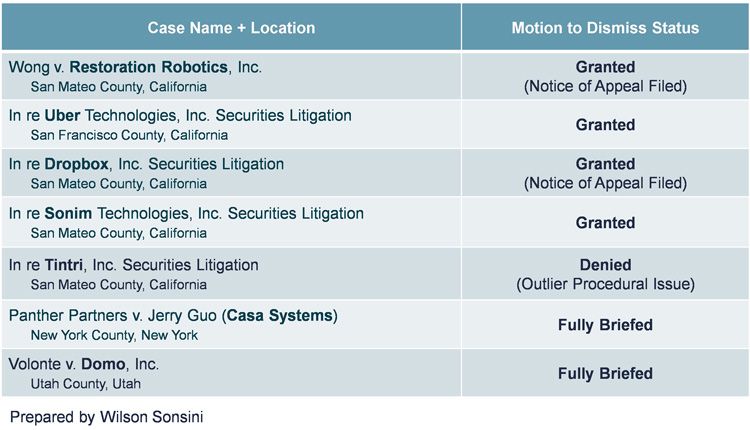Blog
Good News for 2021: Section 11 Litigation Should Start to Ease (Webinar Link Inside)
On the D&O litigation front, 2021 brings good news: The fever of Section 11 litigation against IPO companies in state court looks like it is starting to break. The cure? Federal forum provisions.

A Brief Background
It is no exaggeration to say that the prevalence of state court Section 11 litigation against IPO companies is one of the main causes of the incredibly high premiums and self-insured retentions (similar to deductibles) for companies going public today.
IPO companies whose share prices dropped below their issue prices have found themselves subject to Section 11 litigation not just in federal court but also in state court, with plaintiffs alleging material misstatements and omissions in the S-1 registration statement.
The results have been harrowing. There is a three-year statute of limitations for Section 11 cases, so looking at the IPO class of 2017 is instructive. Through the end of 2020, 27% of these companies have been sued.
This is more than five times the rate at which public companies were sued in 2019, which at 5% was an all-time high (except for outlier IPO laddering cases phenomenon).
The Magic Pill: Federal Forum Provisions
Federal forum provisions, aka the “Grundfest Solution,” have been racking up wins in California state courts in the form of dismissals of registration statement cases.
As a reminder, in March of 2020, the Delaware Supreme Court in Sciabacucchi unanimously held that federal forum provisions are facially valid under Delaware law.
Companies with federal forum provisions in their charter documents are companies for which shareholders are on notice that the company has selected federal court as the exclusive forum for all Section 11 cases.
The provisions preserve the ability of shareholders to bring Section 11 suits while eliminating state courts as an additional, duplicative option for this type of litigation. Shareholders are not inconvenienced if they must bring their Section 11 suit in federal court since there is one in every state.
Sciabacucchi was a reversal of an unfortunate Delaware chancery court decision that had struck down federal forum provisions as invalid. Woodruff Sawyer organized the funding for this appeal, and a group of D&O industry leaders stepped up to participate.
Without their support and the support of the original co-defendants, federal forum provisions would not be a viable option to eliminate duplicative state court Section 11 cases.
But then the pandemic hit, courts closed, and we had a long wait before we could see if state courts hearing Section 11 cases would respect federal forum provisions.
Gaining Traction
The first dismissal of a California state court Section 11 case was the case filed against Restoration Robotics. Restoration Robotics’ litigation counsel, Matthew Rawlinson at Latham, and I discussed this first big win in a webinar shortly after the decision was announced in September 2020.
Then, we had a series of wins, including dismissals from California state court for Uber, Sonim, and Dropbox.
Status of Current FFP State Court Litigation

Of course, there are still open questions. Predictably, plaintiffs are appealing the dismissals. In addition, defendants have asked for dismissals that are yet to be granted in New York and Utah state court.
In another webinar in December, Stanford Law School Professor Joseph Grundfest, Nicki Locker of Wilson Sonsini (who argued and won the Dropbox dismissal), Woodruff Sawyer partner Lauri Floresca, and I discussed the litigation landscape for federal forum provisions. The main discussion was recorded here.

This lively discussion was both entertaining and informative. Topics included:
- Why Restoration Robotics, Uber, Dropbox, and Sonim dismissals all happened as expected
- The plaintiffs’ next moves in California and other states
- What will happen in 2021
Predictions for 2021
Even though the plaintiffs have filed appeals, the efforts—or lack thereof—at bringing new state court-only Section 11 cases may be telling.
According to Woodruff Sawyer’s Databox, our proprietary database of D&O litigation, there were 27 Section 11 cases filed only in state court (no parallel federal court filing) in 2019. That was up from 16 cases in 2018. However, in 2020, there were only two such cases filed.
My Conclusion?
Even though the plaintiffs are appealing the state court dismissals, they are not putting a lot of effort into filing new state court-exclusive cases because they believe these cases will be dismissed when the defendant has federal forum provisions in their charter documents.
Companies thinking about going public as well as existing public companies should implement federal forum provisions.
For existing public companies, proxy advisory service ISS has stated that so long as federal forum provisions are put to a shareholder vote and no particular district court is specified by the provisions, they will not object.
The year 2021 will bring more clarity on the efficacy of federal forum provisions. For now, we are off to an excellent start.
Happy New Year.
Author
Table of Contents












